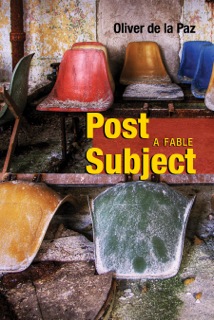 Book Title, Press, Year of Publication:
Book Title, Press, Year of Publication:
Post Subject: A Fable, University of Akron Press, 2014
Synopsis: It’s a series of alphabetically arranged epistolary prose poems addressed to a benevolent “Empire” who may or may not be deceased.
What do you think makes your book (or any book) a “project book”?
There is no decay or atrophy in an initial poetic impulse as it continues over the course of several pages or poems. Each prose poem has a similar structure: they open with a salutation to “Empire,” identify the subject, and follow a similar three stanzagraph form. Though you could also argue for this to be called an “obsession” rather than a “project.” Project sounds a little less romantic and more workmanlike. And while, at times, it did feel like the prose poems were being hewn, rather than bursting forth, there was a romance in the discovery of new possibilities.
Why this subject (or constraint)?
I’ve always been interested in what it means to be a post colonial subject. I’ve been back to the Philippines a number of times since my family left in 1972, and found it interesting that the national hero of the country was a writer (Jose Rizal) rather than a military person. There’s also a strange nostalgia for the colonizer that is clear from what’s on television to the appropriation of army jeeps into jeepneys as one of the most notable means of transportation in the country. So after the Kundiman Retreat in 2007, a group of us started writing postcard poems to each other. I found a box of Magnum Postcards and started writing ekphrastic pieces based on what I was seeing in the postcard, all the while thinking about my return trips to the Philippines. About 40 postcards in I started to get a stronger sense of a unifying principle and so I revised, rewrote, and drafted along the lines of what the book is today.
Are you comfortable with the term “project book”?
Yes. No. Depends on who’s in front of me. As I said earlier, there’s less romance to the writing when you call it a “project.” It sounds like I have to dress more appropriately when I go to work. No casual Fridays. Proper footwear. All that. But on the other hand, calling what I do and what I’ve done a “project” makes me seem less obsessive. Who knows. I haven’t fully wrapped my head around labeling what my process is. It’s my process. I work in series or sequences. Some people may disparage my process and how I put poems together, but that’s how my mind works. I like order. I like devising forms and structures for organizing my messes.
Was your project defined before you started writing? To what degree did it develop organically as you added poems?
Initially these were real postcards written to real people. But after so many postcards (there were about 15 in the postcard group) I started taking a shortcut and came up with the salutation “Dear Empire,” which then brought on a cursory understanding of where the work could be going. So I started to see a shape and structure to the prose poems I was writing during the Kundiman postcard poetry project. Eventually, I revised the pieces after the month of the postcard exchange ended. I then reread Italo Calvino’s Invisible Cities, out of fear that I was writing something derivative. But after awhile, I gave myself permission to continue writing the prose poems.
Did you allow yourself to break your own rules?
Break the rules? No. I’m a mess when I don’t have a set of guidelines or principles steering the drafts.
How important was it for you that each poem could “stand on its own” or that the poems should rely on other poems in the book, or on the premise of the project itself, to succeed? What challenges did this present for you when writing single poems or structuring the book overall?
It’s always important for me to feel that an individual poem in a series can stand on its own. That’s why I send work out to journals and magazines—the editors take some of my guesswork out of the equation when it comes to an individual piece’s ability to exist autonomously.
The biggest challenge was overcoming my worry that I might be boring a reader with how relentless the form and the subject really is. But I eventually came to the understanding that the work in the book succeeds in cohort with manuscript’s volume. A big part of understanding the themes of control, power, history, was that it was in fact layered and overwhelming.
At any point did you feel you were including (or were tempted to include) weaker poems in service of the project’s overall needs? This is a risk, and a common critique, of many project books. How did you deal with this?
Ha! I ignore any misgivings I might have and justify leaving them in the book by telling myself that it’s a flawed book and it’s written by someone with flaws, and that’s okay. Really. I do. I don’t like reading clean, perfectly wrought books. Nor do I make them. I like messy.
Did you fully immerse yourself in writing this project book, or did you allow yourself to work on other things?
At any given moment I work on two or three projects (there, I said the word) simultaneously. I do this because I know I will get bored of a series or sequence and allow myself to wander in new directions as soon as I feel myself pushing away from a sequence.
Did you ever lose momentum, bore yourself, or worry that your project could not be sustained for a full-length book? How did you push through?
Of course. That’s where working on other projects (I said it again) comes in handy. I can readily dip into something else that changes tone, style, form, and refresh my mind for a return to the poems at another time.
As you were writing, were you influenced by your experience or perception of how project books are received by readers and editors (either positively or negatively)? Do you feel differently about your book being defined as a “project book” now that it has been published than you did when you were writing it?
This was a thing I worried about with my first book, which was often described as a novella in verse. But I’m four books into this writing life now, and I’ve come to terms with this part of my process. It’s really not a thing that keeps me up at night. An editor will either want it or push away from it, depending on the style and character of her/his press.
Do you have a sense of whether the fact that this is a project book helped position it to find publication more easily? Has it helped you find readers?
I do know that one other editor liked the manuscript but wanted a few more shifts or changes. I didn’t want to alter my vision for the book, so I went with University of Akron and am quite happy with their work. I’m not sure if it has helped me find readers. It was just released!
What advice can you offer other writers, particularly emerging writers or poetry students who may be using the project book as a guiding principle for their own work?
I find that it’s always a good idea to juggle a couple of projects in order to give your mind a rest and to give yourself a direction once your interest in a single project is starting to wane.


